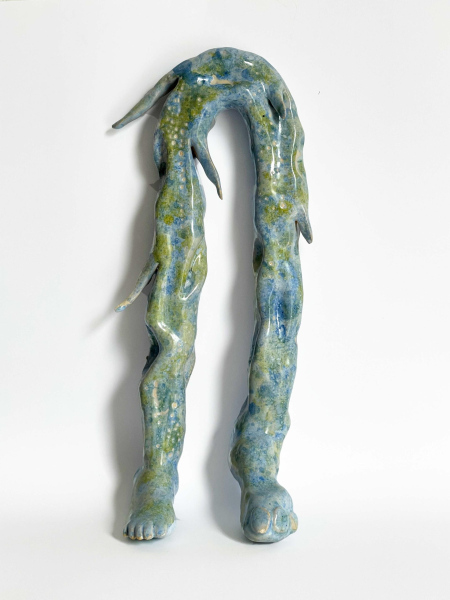-
Remembrance of nature in the milpa subject, 2024. (Dimensions variable, oil pastel on leather, soil, metal)
Remembrance of nature in the milpa subject (2024) is a poetic exercise in inverting anthropocentric traditions to reveal the inherent principles of sustainability and diversity present in nature via indigenous farming practices. By juxtaposing a drawing of a milpa plant, and BDSM materials it highlights the fragility of diverse forms of life, vis a vis Adorno’s reflection that people are a part of nature and that art is where the repression and denial of nature is remembered. Similarly to the milpa polyculture in Mesoamerica fighting for survival against agricultural multinationals; recently Peru re-categorised transness as a mental illness; currently in the UK 13 sex acts are banned; and the far right has become mainstream.
The work engages with the practice of herbarium, the collection of preserved plant specimens and its data for scientific study that dates back to 15th century Europe and went on to become the basis for taxonomy - a scheme of hierarchical classification, in which everything is organized into groups. Through colonialism that same taxonomy was applied to rank people, identities and practices. The consequences of which still manifest in the necropolitics that disproportionately subjugate certain social groups today.
Climate collapse is only one of the consequences of the western tradition of anthropocentrism which places nature below humanity in the order of importance. Contrary to this order of things, in many indigenous cultures these hierarchies don’t exist: whereby people, animals and nature are equal parts of the same ecosystem. The milpa is a farming practice in Mesoamerica of polyculture consisting of several crops, having maize as staple which also according to Mayan mythology is the plant from which humans were created. Through the milpa, soil erosion is avoided and each crop protects the other against insects, reducing the use of pesticides. However, the milpa is also understood as an epistemology and ecology, a way of thinking and existing in the world with diversity, solidarity and sustainability.
-
-
 Will Fredo, “Remembrance of nature in the milpa subject (person, rhino, Araucaria tree)”, 32 x 12 x 11 cm.
Will Fredo, “Remembrance of nature in the milpa subject (person, rhino, Araucaria tree)”, 32 x 12 x 11 cm.-
1
Will Fredo, “Remembrance of nature in the milpa subject (person, rhino, Araucaria tree)”, 32 x 12 x 11 cm.
Will Fredo, “Remembrance of nature in the milpa subject (person, rhino, Araucaria tree)”, 32 x 12 x 11 cm.
“Remembrance of nature in the milpa subject” plays with the idea of a multi species subject made up of human, animal and nature elements. The concept is informed by the ancestral principle of polyculture on both sides of the Atlantic, serving as a metaphor for an urgent post-human co-existence on Earth.
-
1
-
Will Fredo, “Remembrance of nature in the milpa subject (paw, branch, foot)”, 32 x 12 x 11 cm.
“Remembrance of nature in the milpa subject” plays with the idea of a multi species subject made up of human, animal and nature elements. The concept is informed by the ancestral principle of polyculture on both sides of the Atlantic, serving as a metaphor for an urgent post-human co-existence on Earth.





